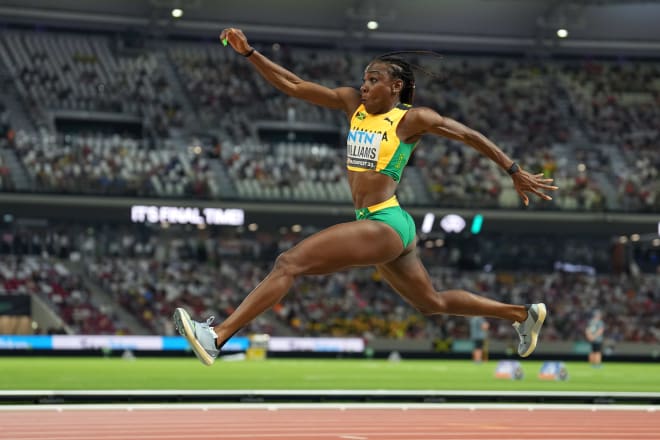Q&A: Four-time Olympian, FSU grad Kimberly Williams
Just by making the trip to Paris, Kimberly Williams has made history. The 2012 Florida State graduate is the first woman in FSU history to earn a fourth bid to the Summer Olympics.
Williams qualified for Paris with a mark of 13.67 meters at Jamaica's Olympic Trials.
Inducted into the FSU Athletics Hall of Fame in 2021, Williams is one of the most accomplished women in the track program's history. From 2008-11, she won five individual NCAA titles, marking the most for any female in program history. Williams won 12 individual ACC gold medals over her career, which is the most for any Seminole.
Williams answered questions from the Osceola while training in London, prior to traveling to Paris. She took part in the Opening Ceremonies on Friday with Jamaica.
The track and field events will run from August 1-11 at State De France. (A day-by-day Olympics schedule can be found here.)

Little boys and girls around the world dream of competing in the Olympics. This is your fourth Summer Games. Was this the dream? Do you find that you’re pinching yourself?
Williams: Oh, yes, it absolutely was my dream to compete in more than one Olympic Games. Younger me thought it would be cool to compete in five games. Sadly, I injured my hamstring at the 2008 Jamaican Olympic trials and did not make the Beijing team. Even though this will be my fourth Games, the emotions remain the same. I'm humbled and excited to have made another Olympic team. It's a feat many athletes strive to achieve. I love wearing the Black, Gold, and Green. That excitement never fades. I feel like when it does, it will be time to retire.
Share an experience from one of your prior Olympics. Is there time to connect with other competitors? Do you have time to be a tourist or take in other events during an Olympiad?
Williams: At the London 2012 Olympics, my first Games, I was amazed at how many athletes loved eating at the McDonald's in the village. Village life is so much fun and trading pins is a tradition that helps you meet athletes from different sports and countries. It’s funny, someone once told me that Jamaican pins are rare because we hardly ever have them. We get a certain number, so trading wisely is key. Competing early in the schedule usually gives me plenty of time to be a tourist and to check out other events if I can get tickets. The village has fantastic TV coverage, with channels for every sport and even specific feeds for field events. When I compete later in the schedule, I try to book an extra day so I can explore and enjoy the host city, either with friends or on my own.
Who do you feel has helped you post-FSU? Dennis Nobles? Bob Braman? A personal coach, someone from the Jamaican team?
Williams: A lot of people played a crucial role in supporting me post-FSU. Coach Dennis Nobles has been a significant influence, helping me realize my potential. Although he retired from coaching at FSU, I told him he can't retire from working with me. I’m deeply grateful to Coach Nobles for all that he has done and for continuing to work with me whenever I'm in town. Dealing with injuries has been a challenge and I'm thankful for the support from Jerry Latimer, Dr. William Thompson, my overseas physio(therapist) Poora Singh and several others. I hope they don’t get upset because I didn’t name them. They all played an essential role in helping me stay healthy or recover from injuries. Coach B has always offered encouraging words and expressed how proud he is of me. My Santiago/Balog family is incredibly supportive. My family and close friends have been a huge source of motivation and sanity, especially during tough times with injuries.
In 2021, you told the Osceola before the last Olympics that your distances were improving and “it shows that I am getting better with age.” Now you're 35 and still among the world's best. Have you seen improvements in your technique in recent years?
Williams: Ha! In my mind I’m still 25 — every year after that is just experience. I have seen improvements. But unfortunately injuries have held me back from showcasing my hard work in my results. I’m hopeful that I can stay healthy over the next few years, finish strong and retire on a high note.
How much of the year are you in Tallahassee / at FSU? How often are you traveling and competing? Do you still keep up with FSU track, talk with coaches or current athletes?
Williams: My competition schedule varies and since I enjoy traveling, I tend to get up and go whenever I please. I stay connected with FSU track and other FSU sports. I know the coaches on staff, so we do speak and I have brief exchanges with the current athletes when I see them at the track.
How challenging are the finances of track and field as far as paying for travel and personal coaches or trainers? Have relationships with Jamaica’s national team or FSU’s coaching staff helped in that regard? Or sponsors?
Williams: Track and field is an individualized sport and the financial aspects varies between athletes, events and countries. Some athletes have contracts that cover everything, including travel, coach stipends and physio, while others have smaller contracts that only cover basic expenses or just provide gear. Others are fortunate enough to have a shoe contract, external sponsors and support from their country through a tier system or lottery. Sadly, many athletes compete without contracts, meaning they work while training and personally fund their own way to a lot of meets, covering accommodation and other related costs themselves. When you get invited to a high ranked meets, they cover travel, accommodations and meals. However, smaller meets might not have the budget to cover these expenses. Athletes and their coaches often have agreements where the athlete pays the coach a specific amount or percentage. The arrangements for trainers, physio, strength coaches, doctors, dietitians etc. vary depending on the athlete's agreements with these individuals. Paris will have a lot of unsponsored athletes and the Olympics don’t pay.
We always hear that track and field is bigger in Jamaica or in Europe. But it also strikes me as a good social media sport, one where people could watch a race or event in a video clip while scrolling. What can the sport do to elevate its profile in the U.S. or use social media platforms?
Williams: Track and field certainly has a larger following in Jamaica and Europe. The fans in Europe are engaging and knowledgeable about the athletes and their events. In Jamaica, our high school championships draw a huge crowd, with fans proudly wearing their respective school colors and cheering loudly. The crowd at "Champs" is actually bigger than at our Olympic trials. It's an experience I think many people should try to witness. The second part of this question has me thinking too hard. I feel like in the States, track and field doesn’t get enough visibility and is often only noticed during the Olympic year. The sport needs more exposure on TV, accessible streaming services and additional sponsorships. Track and field competes with sports that already have a strong following in America, which makes it challenging. While many people are familiar with sprints and middle distance, not everyone knows, for example, that the decathlon doesn’t include the triple jump. I think educating the general public about the different events, rules, and history could be a great start. Since social media content is often consumed in bite-sized pieces, we should present this information accordingly. Additionally, featuring top athletes from other sports trying our events could highlight the challenge and skill involved. While the events might seem intimidating or painful at first glance, showcasing expert performances can demonstrate that, when done correctly, they are not as daunting as they appear. Lastly, the Netflix series Sprint is good for track and field. I hope it will help attract new fans and, eventually, that the directors will branch out to cover other events in the sport.
Sign up for the Osceola's free daily email newsletters
Follow The Osceola on Facebook
Follow The Osceola on Twitter
Subscribe to the Osceola's YouTube channel
Subscribe to the Osceola's podcasts on Apple
